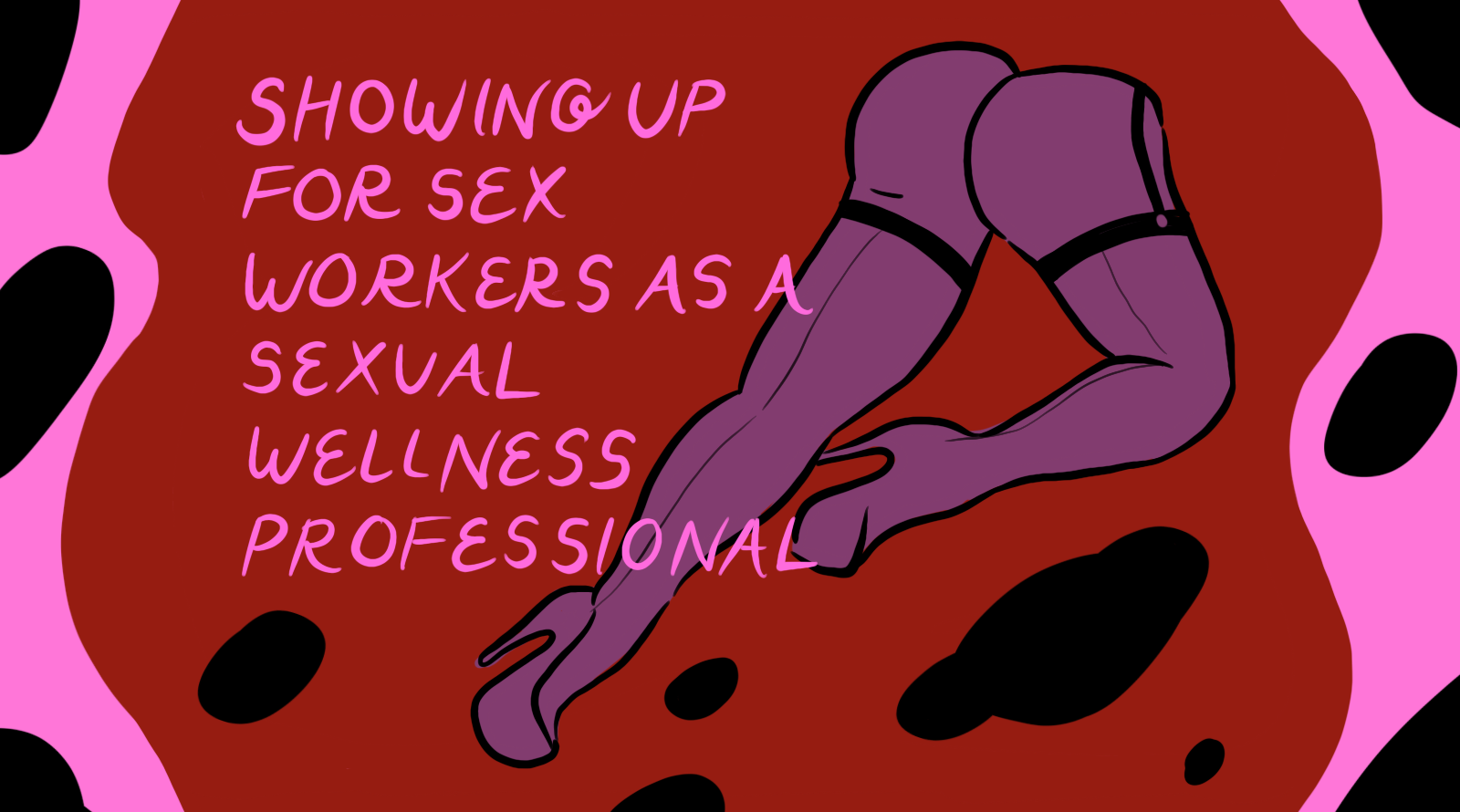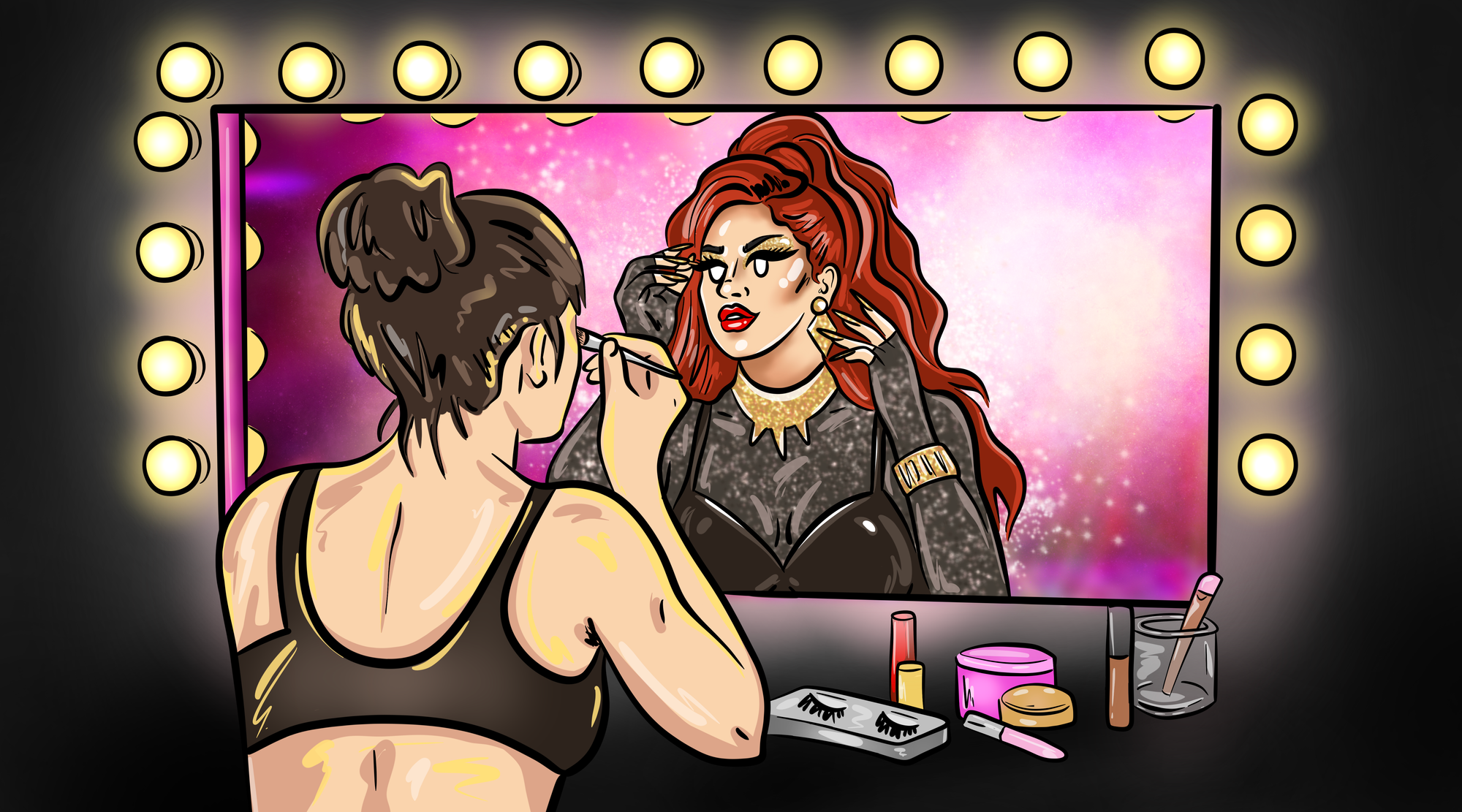As a surrogate partner and somatic sex educator, my work with clients involves hands-on sexual experience as well as therapeutic healing tools, so I often find myself straddling the two worlds of sex work and the wellness industry. Lately I’ve seen an increasing number of therapists and coaches aiming to be more “sex positive,” and a lot more providers overall whose practice sits as the intersection of sexuality and healing. Many of these practitioners want to be in solidarity with sex workers, but in the attempt to be an ally, I’ve seen and heard some fumbles – and have fumbled myself. Being a sexually progressive wellness practitioner isn’t as simple as slapping the label “sex work ally” up on your website and calling it a day. If you’re a practitioner in the sexual wellness field who wants to show up for sex workers, here are some tangible ways to do it:
Don’t throw sex workers under the bus to legitimize your profession
If you’re a sexological bodyworker, surrogate partner, tantrika, sacred intimate, or other healing touch provider, your work owes its existence to sex workers throughout history who’ve brought sex work out of the shadows. This includes those who’ve fearlessly and publicly discussed their experience in the sex industry – like Maya Angelou, Carol Leigh, Marsha P. Johnson, and Cardi B – as well as the unnamed strippers and dancers who’ve created the sexual aesthetic that’s everywhere in mainstream music, movies, television, and fashion today. We wouldn’t be able to do what we do if not for this lineage of sex workers, and it’s important to honor that lineage in the way we present our work.
One critical piece of this is to not distance your practice from sex work in order to come across as more professional. Besides, “professionalism” is coded language that’s often used to enforce standards of white supremacy and ableism, so maybe it’s time to drop that word entirely. As providers who face far less legal risk than escorts and other criminalized sex workers do, we have the safety and positioning to help destigmatize sex work. If you’ve ever been asked what makes your work different from sex work, a great answer is, “Actually, I see my work as under the umbrella of sex work.”
Another opportunity for solidarity is when you encounter anti-sex work bias in your work. Whether it’s a client telling you why they’d rather see you than an escort, a peer perpetuating harmful myths about sex work, or a teacher who distances their modality from sex work, you can show up for these teachable moments with firmness, compassion, and facts. A gentle correction – as well as simply modeling a shame-free attitude toward sex work – can go a long way in shifting mindsets.
Acknowledge the privilege you carry in the field of sex work and center the voices of those who are most marginalized
While it’s important that sexual wellness practitioners don’t distance ourselves from sex work, it’s equally important that we don’t take center stage in conversations about sex work. Sex workers who face the most marginalization and risk in their work – people of color, trans and gender nonconforming workers, disabled workers, and street workers – should always be at the center of conversations about sex work. For those of us who have the privilege and protection that comes from being associated with therapy and wellness culture, it’s important to know when to use our voice and when to just listen.
This doesn’t mean you shouldn’t be an advocate – it just means knowing when to step back. If a comments thread is full of anti-sex work voices, that can be a great time to vocalize your solidarity. But if other sex workers are already commenting, it’s often better to elevate their voices rather than center your own.
Sex worker mutual aid funds are another important space to own your privilege. These funds are often strapped for cash and struggle to fulfill all the requests they get. Rather than apply for these limited resources (which I certainly saw happen when I was part of Bay Area Workers’ Support mutual aid team), leave them for workers who have been hardest hit by the pandemic and inflation. While our work may take a dip during turbulent times, we have much more security than the average sex worker does.
Give money to sex workers who face systemic oppression
In the theme of financial security, one of the best ways to be in solidarity with other sex workers is to donate money! There are all sorts of ways to do this. One of the easiest is to donate to a sex worker-run mutual aid fund like Lysistrata, Red Canary Song, or Bay Area Workers’ Support, who vet applicants to prioritize those with the highest need. You can also donate directly to individual sex workers in your community when they ask for support. Another great option is to donate to organizations that provide resources and advocacy for sex workers, like St. James Infirmary, SWOP Behind Bars, the Black Sex Workers Collective, DecrimNY, and Coalition for Rights and Safety for People in the Sex Trade.
Use the right language.
It’s a simple one but using respectful, empowering language is a key part of being in solidarity. Although sex workers may use terms like “whore”, “prostitute,” and “hooker” self-referentially as a way to reclaim slurs and language that’s historically been used to oppress, “sex worker” is the correct term to use in public forums. The term “sex work” was created by Carol Leigh in 1979 in defiance of the feminist movement’s disempowering portrayal of sex workers. “It acknowledges the work we do rather than defines us by our status,” she wrote.
Similarly, although you may hear terms like “john” and “trick” within sex worker circles, the right terminology to use is “clients.” Using coded terms contributes to the belief that clients of sex workers are somehow bad, dirty, or different from consumers of other services. Calling clients what they are – “clients” – demonstrates that seeing a sex worker is much like seeing any other provider, like a masseuse, chiropractor, or acupuncturist.
Refer clients to sex workers
There are all sorts of skills sex workers can provide that most wellness practitioners can’t, including hand-on experience with sex. Working with a couple who wants to try a threesome for the first time? Hiring an escort is a great way to experiment without all the negatives of unicorn hunting. Got a client who’s curious about BDSM? Pro Doms can be a great referral, offering kink education in a playful format. Network with local sex workers so you can build a list of providers for referrals – Tryst is a great place to search!
Referring out to sex workers can be tricky for practitioners who work under the restrictions of licensure. You have to decide for yourself whether this is something you’re comfortable with. I encourage practitioners to consider both the privileges they carry and the risks they face; if you’re someone with a decent amount of safety (wealth, graduate degrees, racial privilege, etc.), perhaps it’s worth the risks; shifting cultural attitudes and policy requires those with privilege to take some risks.
Follow and learn from providers whose work straddles the fields of sex work and wellness
When it comes to being in solidarity with sex workers as a sexual wellness practitioner, there’s no one better to learn from than folks who are doing both. Check out and follow these rad providers:
- Raquel Savage, therapist and sex worker (Twitter/IG)
- Annie Sprinkle, sexologist and artist (Twitter/IG)
- Kai Cheng Thom, somatic sex educator (IG)
- Britta Love, somatic sex educator (Twitter/IG)
- Evie Vigil, sex worker and somatic sex educator (IG)
- Dame Sadie, kinklesque performer, femdom, and BDSM educator (IG)
NB. I have a lot of qualms about the term “wellness.” What does “wellness” even mean, and how did it become an entire industry? There are a lot of great resources on this topic, like “Real Talk: Is the Wellness Industry a Total Scam?”, Prentis Hemphill’s Lineage of Embodiment panel series, and “Examining the ‘Wellness’-to-Far-Right-Conspiracy pipeline”
Are you a sex worker with a story, opinion, news, or tips to share? We'd love to hear from you!
We started the tryst.link sex worker blog to help amplify those who aren't handed the mic and bring attention to the issues ya'll care about the most. Got a tale to tell? 👇☂️✨




